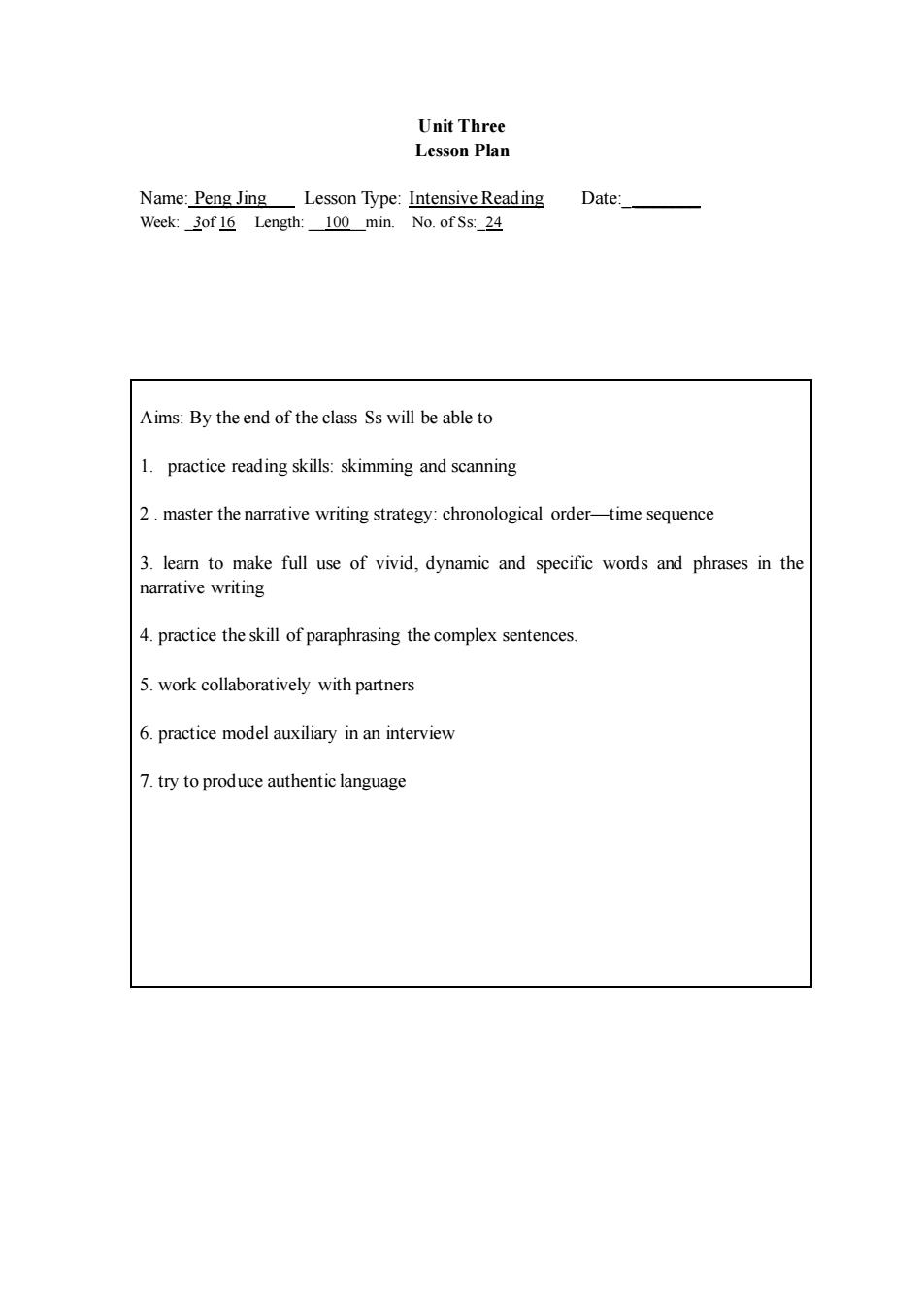
Unit Three Lesson Plan Name:Peng Jing Lesson Type:Intensive Reading Date: Week:of 16 Length:100 min.No.ofSs:_24 Aims:By the end of the class Ss will be able to 1.practice reading skills:skimming and scanning 2.master the narrative writing strategy:chronological order-time sequence 3.learn to make full use of vivid,dynamic and specific words and phrases in the narrative writing 4.practice the skill of paraphrasing the complex sentences. 5.work collaboratively with partners 6.practice model auxiliary in an interview 7.try to produce authentic language
Unit Three Lesson Plan Name: Peng Jing Lesson Type: Intensive Reading Date:_ _ Week: _3of 16 Length: _100_min. No. of Ss:_24 Aims: By the end of the class Ss will be able to 1. practice reading skills: skimming and scanning 2 . master the narrative writing strategy: chronological order—time sequence 3. learn to make full use of vivid, dynamic and specific words and phrases in the narrative writing 4. practice the skill of paraphrasing the complex sentences. 5. work collaboratively with partners 6. practice model auxiliary in an interview 7. try to produce authentic language
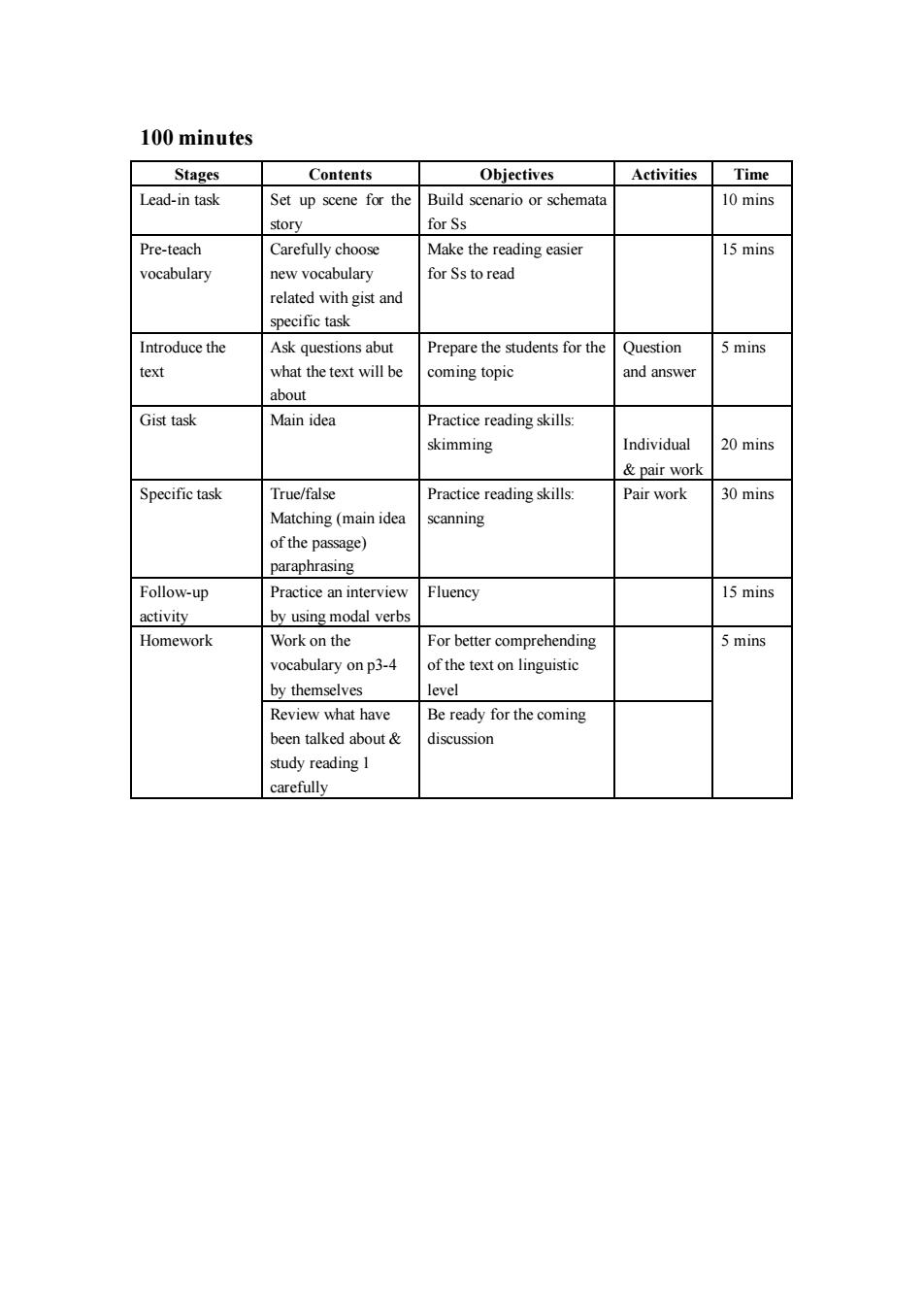
100 minutes Stages Contents Objectives Activities Time Lead-in task Set up scene for the Build scenario or schemata 10 mins story for Ss Pre-teach Carefully choose Make the reading easier 15 mins new vocabulary for Ss toread related with gist and specific task Introduce the Ask questions abut Prepare the students for the Ouestion 5 mins what the text will be oming topic and answe about Gist task Main idea Practice reading skills skimming Individual 20 mins pair work Specific task True/false Practice reading skills Pair work 30 mins Matching( scanning of the passage) paraphrasing Follow-up Practice an interview Fluency 15 mins byusing modal verb Homework Work on the For better comprehending 5 mins vocabulary on p3-4 of the text on linguistic by themselves level Review what have Be ready for the coming been talked abou discussion study reading carefully
100 minutes Stages Contents Objectives Activities Time Lead-in task Set up scene for the story Build scenario or schemata for Ss 10 mins Pre-teach vocabulary Carefully choose new vocabulary related with gist and specific task Make the reading easier for Ss to read 15 mins Introduce the text Ask questions abut what the text will be about Prepare the students for the coming topic Question and answer 5 mins Gist task Main idea Practice reading skills: skimming Individual & pair work 20 mins Specific task True/false Matching (main idea of the passage) paraphrasing Practice reading skills: scanning Pair work 30 mins Follow-up activity Practice an interview by using modal verbs Fluency 15 mins Homework Work on the vocabulary on p3-4 by themselves For better comprehending of the text on linguistic level 5 mins Review what have been talked about & study reading 1 carefully Be ready for the coming discussion
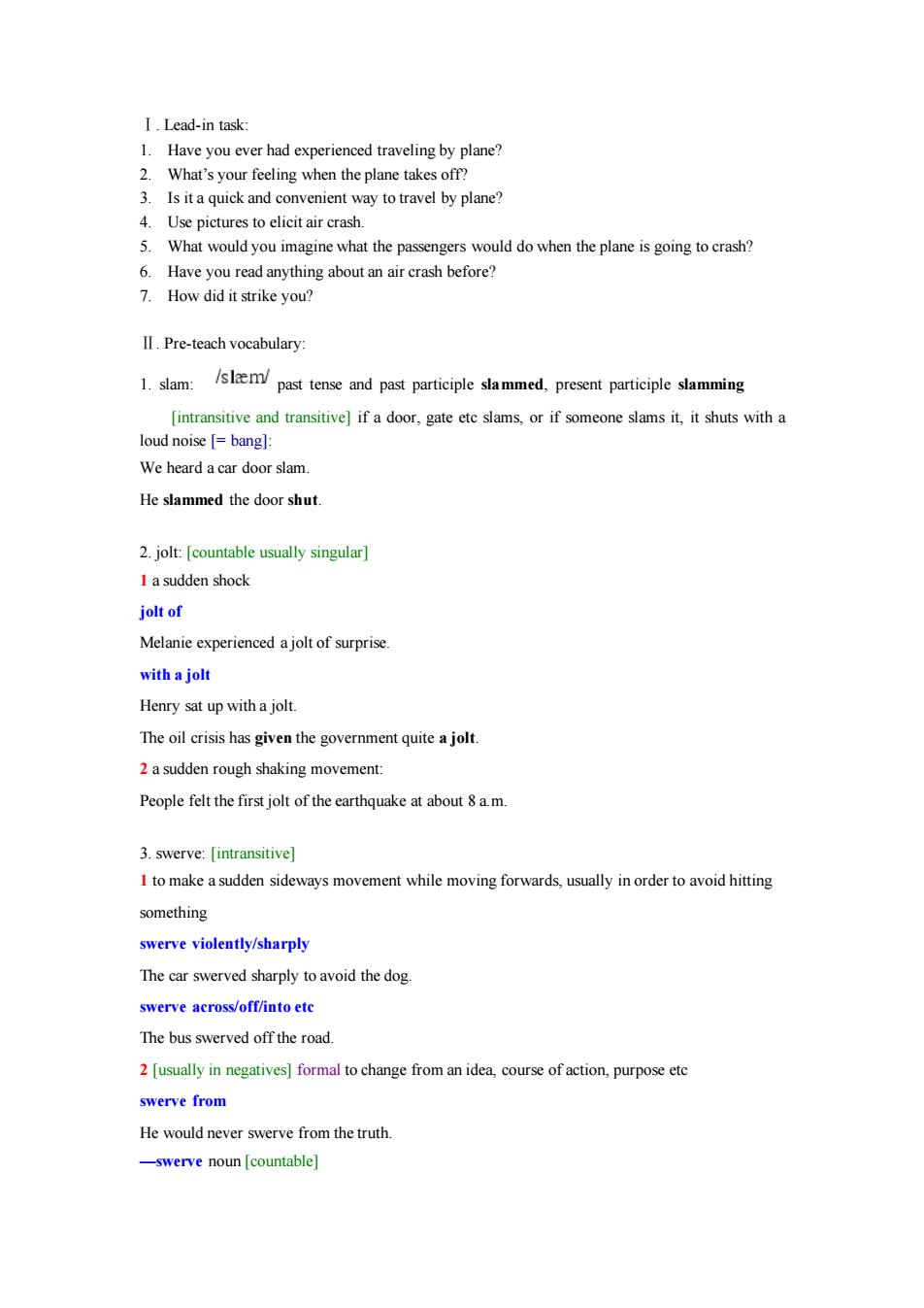
I.Lead-in task .2 Have you ever had experienced traveling by plane What's your feeling when the plane takes off? 3.Is it a quick and convenient way to travel by plane? 4.Use pictures to elicit air crash. 5.What would you imagine what the passengers would do when the plane is going to crash? 6.Have you read anyth ng about an air rash hefore? How you? II.Pre-teach vocabulary: [intransitive and transitive]if a door,gate etc slams.or if someone slams it,it shuts witha loud noise [=bang]: We heard a car door slam. He slammed the door shut. 2.jolt:[countable usually singular] I asudden shock jolt of Melanie experienced ajo of surprise. with ajolt Henry sat up witha jot The oil crisis has given the government quiteajo 2asudden rough shaking movement: People felt the first jolt of the earthquake at about 8am 3.swerve:[intransitive] 1 to make asudden sideways movement while moving forwards,usually in order to avoid hitting something swerve violently/sharply The car swerved sharply to avoid the dog. swerve across/off/into ete The bus swerved offthe road 2[usually in negatives]formal to change from an idea,course of action,purpose etc swerve from He would never swerve from the truth. swerve noun [countable]
Ⅰ. Lead-in task: 1. Have you ever had experienced traveling by plane? 2. What’s your feeling when the plane takes off? 3. Is it a quick and convenient way to travel by plane? 4. Use pictures to elicit air crash. 5. What would you imagine what the passengers would do when the plane is going to crash? 6. Have you read anything about an air crash before? 7. How did it strike you? Ⅱ. Pre-teach vocabulary: 1. slam: past tense and past participle slammed, present participle slammingDOOR ETC [intransitive and transitive] if a door, gate etc slams, or if someone slams it, it shuts with a loud noise [= bang]: We heard a car door slam. He slammed the door shut. 2. jolt: [countable usually singular] 1 a sudden shock jolt of Melanie experienced a jolt of surprise. with a jolt Henry sat up with a jolt. The oil crisis has given the government quite a jolt. 2 a sudden rough shaking movement: People felt the first jolt of the earthquake at about 8 a.m. 3. swerve: [intransitive] 1 to make a sudden sideways movement while moving forwards, usually in order to avoid hitting something swerve violently/sharply The car swerved sharply to avoid the dog. swerve across/off/into etc The bus swerved off the road. 2 [usually in negatives] formal to change from an idea, course of action, purpose etc swerve from He would never swerve from the truth. —swerve noun [countable]
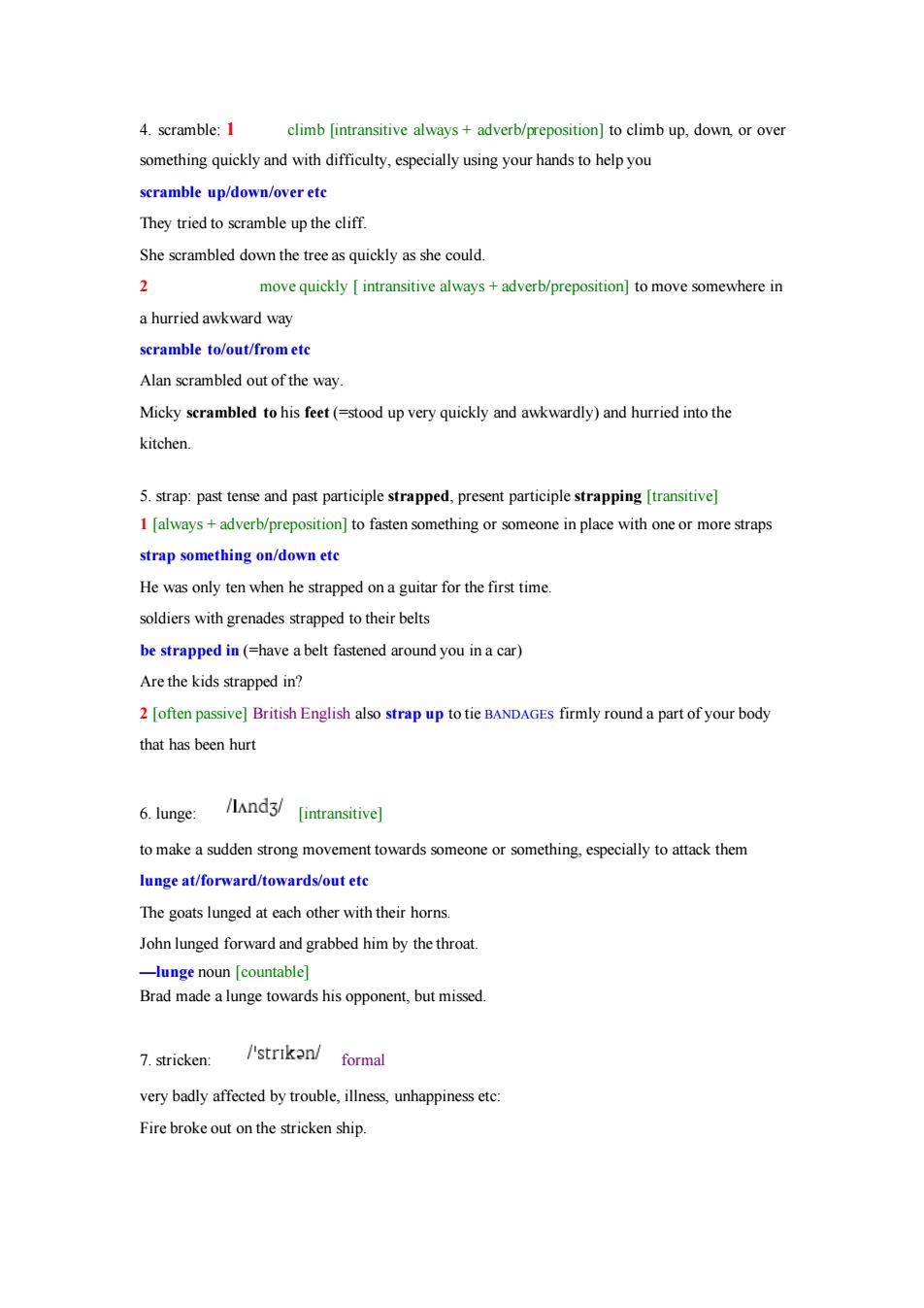
4.scramble:1 climb [intransitive always+adverb/preposition]to climb up,down or over something quickly and with difficulty,especially using your hands to help you scramble up/down/overete They tried to scramble up the cliff. She scrambled down the tree as quickly as she could. 2 move quickly intransitive always+adverb/preposition]to move somewhere in a hurried awkward way scramble to/out/fromete Alan scrambled out of the way Micky serambled to his feet(=stood up very quickly and awkwardly)and hurried into the kitchen. 5.strap:past tense and past participle strapped,present participlestrapping ransitive 1 [always+adverb/preposition]to fasten something or someone in place with one or more straps strap something on/down ete He was only ten when he strapped ona guitar for the first time. soldiers with grenades strapped to their belts be strapped in(-have a belt fastened around you ina car) Are the kids strapped in? 2 loften passivel british english also strap up to tie BANDAGEs firmly round a part of your body that has been hurt 6.lunge: /IAnd3/[intransitive] to make a sudden strong movement towards someone or something.especially to attack them lunge at/forward/towards/out ete The goats lunged at each other with their horns. John lunged forward and grabbed him by the throat 一unge noun [countable] Brad made alunge towards his opponent,but missed /'strikan/formal very badly affected by trouble,illness,unhappiness etc Fire broke out on the stricken ship
4. scramble: 1CLIMB climb [intransitive always + adverb/preposition] to climb up, down, or over something quickly and with difficulty, especially using your hands to help you scramble up/down/over etc They tried to scramble up the cliff. She scrambled down the tree as quickly as she could. 2MOVE QUICKLY move quickly [ intransitive always + adverb/preposition] to move somewhere in a hurried awkward way scramble to/out/from etc Alan scrambled out of the way. Micky scrambled to his feet (=stood up very quickly and awkwardly) and hurried into the kitchen. 5. strap: past tense and past participle strapped, present participle strapping [transitive] 1 [always + adverb/preposition] to fasten something or someone in place with one or more straps strap something on/down etc He was only ten when he strapped on a guitar for the first time. soldiers with grenades strapped to their belts be strapped in (=have a belt fastened around you in a car) Are the kids strapped in? 2 [often passive] British English also strap up to tie BANDAGEs firmly round a part of your body that has been hurt 6. lunge: [intransitive] to make a sudden strong movement towards someone or something, especially to attack them lunge at/forward/towards/out etc The goats lunged at each other with their horns. John lunged forward and grabbed him by the throat. —lunge noun [countable] Brad made a lunge towards his opponent, but missed. 7. stricken: formal very badly affected by trouble, illness, unhappiness etc: Fire broke out on the stricken ship
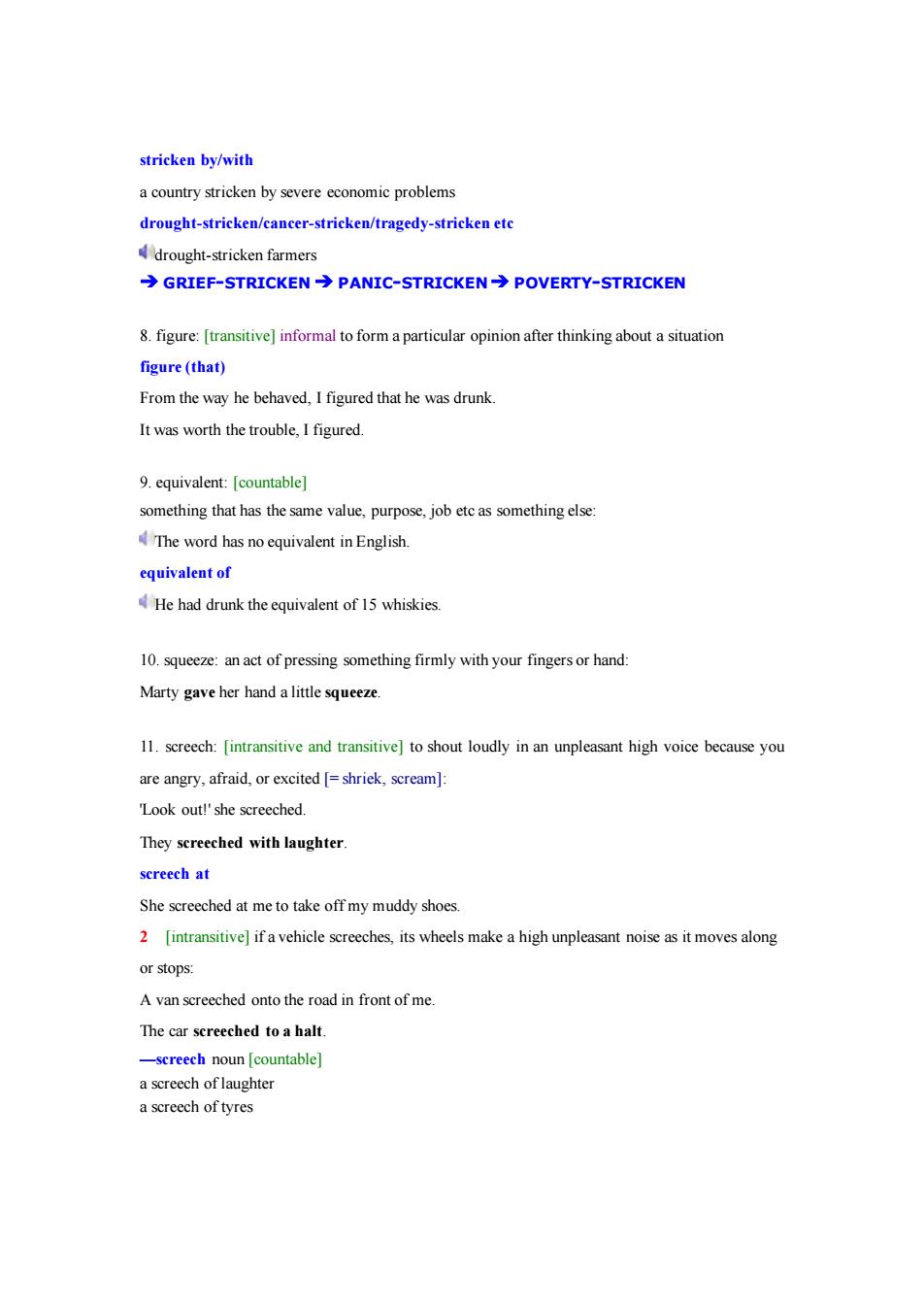
stricken by/with a country stricken by severe problems drought-stricken/eancer-stricken/tragedy-stricken ete drought-stricken farmers →GRIEF-STRICKEN→PANIC~STRICKEN→POVERTY-STRICKEN 8.figure:[transitive]informal to form a particular opinion after thinking about a situation figure(that) From the way he behaved,I figured that he was drunk. It was worth the trouble,I figured. 9.equivalent:[countable something that has the same value,purpose,job etc as something else: The word has noequivalent in English. equivalent of He had drunk the equivalent of 15 whiskies 10.act of pressing something firmly with your fingersor hand Marty gave her hand alittle squeeze 11.screech:[intransitive and transitive]to shout loudly in an unpleasant high voice because you are angry.afraid,or excited =shriek,scream] Look out!'she screeched. They screeched with laughter. screech at She screeched at me to take off my muddy shoes. 2 [intransitive]ifa vehicle sreeches,its wheels make a high unpleasant noise as it moves along or stops A van screeched onto the road in front of me. The car screeched to a halt -sereech noun [countable a screech of laughter a screech of tyres
stricken by/with a country stricken by severe economic problems drought-stricken/cancer-stricken/tragedy-stricken etc drought-stricken farmers ➔ GRIEF-STRICKEN ➔ PANIC-STRICKEN➔ POVERTY-STRICKEN 8. figure: [transitive] informal to form a particular opinion after thinking about a situation figure (that) From the way he behaved, I figured that he was drunk. It was worth the trouble, I figured. 9. equivalent: [countable] something that has the same value, purpose, job etc as something else: The word has no equivalent in English. equivalent of He had drunk the equivalent of 15 whiskies. 10. squeeze: an act of pressing something firmly with your fingers or hand: Marty gave her hand a little squeeze. 11. screech: [intransitive and transitive] to shout loudly in an unpleasant high voice because you are angry, afraid, or excited [= shriek, scream]: 'Look out!' she screeched. They screeched with laughter. screech at She screeched at me to take off my muddy shoes. 2 [intransitive] if a vehicle screeches, its wheels make a high unpleasant noise as it moves along or stops: A van screeched onto the road in front of me. The car screeched to a halt. —screech noun [countable] a screech of laughter a screech of tyres